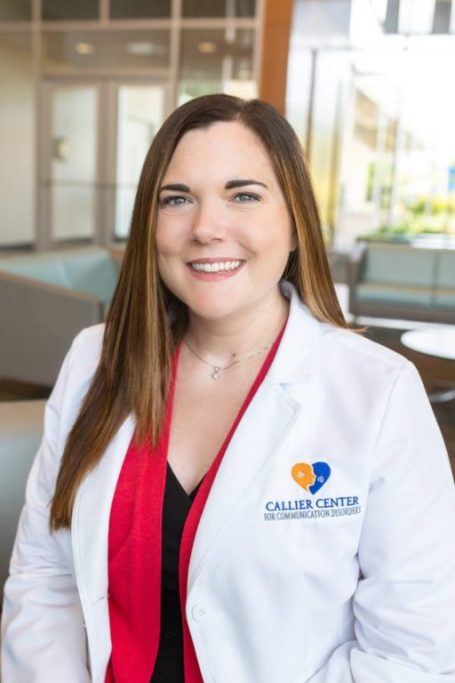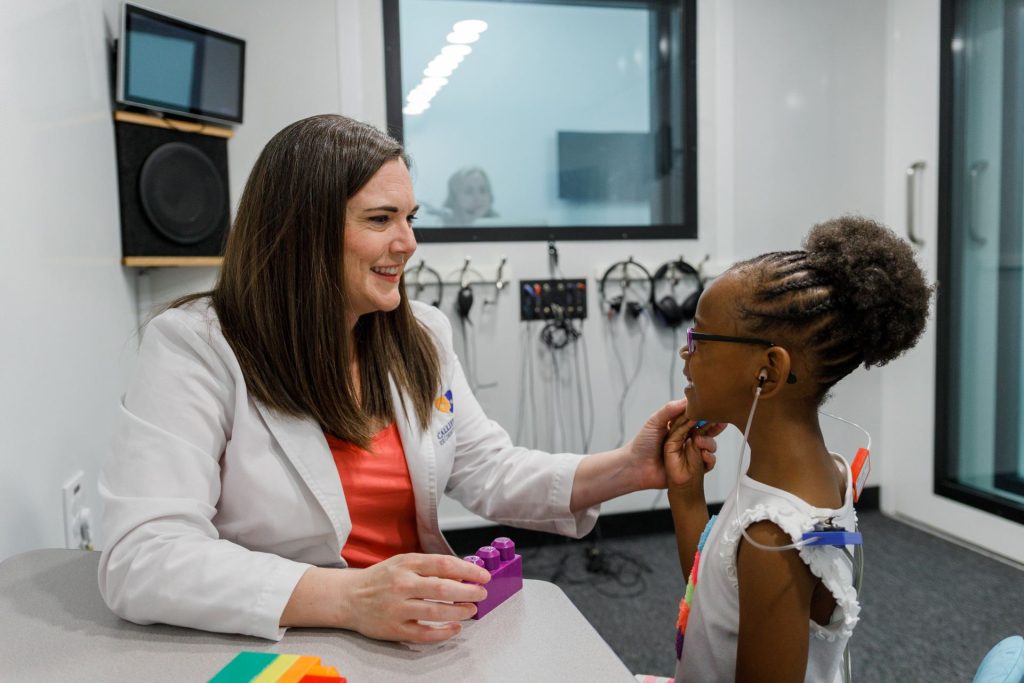A Guiding Hand for Patients, Family Facing Hearing Loss
October 12, 2022

October is National Audiology Awareness Month, which is a special time for outreach for Stephanie Williams AuD’08, a member of the clinical staff at the Callier Center for Communication Disorders at The University of Texas at Dallas. The UT Dallas alumna has brought a love for working with children and their families to the Callier Center’s growing pediatric audiology group where she leads the center’s efforts to help children and their families manage hearing disabilities.
“Following the diagnosis of hearing loss, we want to be a resource not only for our patients, but also for their families who want to know what they can do to help their child live their best life,” Williams said.
Williams grew up in the small town of Stamford in West Texas. Her mother was a special education teacher who worked with children with disabilities, and Williams grew up with her mom’s love for kids with special needs. That upbringing started her on an educational path that began at Baylor University where she earned a bachelor’s degree in communication sciences and disorders.
Originally interested in speech pathology, Williams enjoyed her undergraduate audiology courses so much that she ended up switching to audiology before it came time to apply to graduate school. Her own childhood experience also influenced her career direction. Like many young children, Williams grew up suffering from chronic ear infections that meant she spent a lot of time seeing doctors and working with audiologists.
“I grew up going to the audiologist a lot because I had chronic ear infections until I was 15 years old,” Williams said. “The funny thing is an audiologist who had known me for a while asked me if I wanted to be an audiologist when I grew up? And I said, no, because, at the time, it seemed like the most boring thing.”
Once Williams decided that audiology was her future, the decision on where to apply to graduate school was easy. The Callier Center’s audiology program is one of the most respected in the country and the doctorate program ended up being the only one she applied to. Williams was accepted and began her doctoral studies in 2004.
While studying at UT Dallas, Williams participated in an international program working with Callier Center clinical professor and alumna Jackie Clark MS’87, PhD’95 who took UTD audiology students to Africa to conduct hearing screenings in Mozambique. The experience made a huge impression on Williams.
“I just knew I wanted to be involved here (in Africa) and that this is how I want to use my degree and profession,” she said.
After graduating from UTD in 2008 and starting her career with Medical City Dallas, Williams continued to visit Africa with her church to provide audiology services. Her time in Africa showed her how much the people there desperately needed professional medical care, and she decided to make a career move.
While working with a group considering starting an audiology training program in Africa, Williams met a doctor working at a rural medical clinic in Kenya who convinced Williams to provide audiology services at his clinic. In 2013, she moved to Kenya where she worked for more than five years, starting the country’s first newborn hearing screening program and working with faculty at the University of Nairobi to set up curriculum to start an audiology bachelor’s degree program.
In 2018, an opportunity at the Callier Center for an educational audiologist pulled Williams back to Texas where she was soon offered the position of pediatric audiology lead and tasked with expanding the program.

“We have doubled our pediatric audiology practice since 2019 and continued to grow through the COVID pandemic,” Williams said. “It’s been really fun and rewarding to find creative ways to grow.”
One of the most important jobs of an audiologist is diagnosing a patient’s hearing loss, but according to Williams, it’s equally as important, especially for their pediatric patients, to be a resource for the family as they adjust to their child’s new reality.
“It’s just as important, or more important, to make sure the family fully understands what that diagnostic testing tells us and what they need to be thinking about in order to move toward what they’d like for their family and their child to accomplish,” Williams said. “We like to tell them, ‘You’re walking out of here with the same child you walked in with today. You’re just more prepared now to help them meet the world as they are.’”